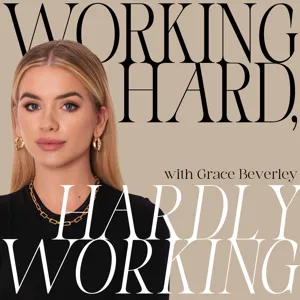Podcast Summary
Finding Hidden Talent on LinkedIn and Mother's Day Gifts: Small businesses can tap into LinkedIn's vast candidate pool to find potential hires, while Mother's Day gifts from 1800 Flowers make for unique presents.
LinkedIn is an essential platform for small businesses looking to hire professionals, as it provides access to a large pool of potential candidates who may not be actively searching for new jobs. This is similar to finding your car keys in a fish tank if you're not looking there. Additionally, LinkedIn users often don't visit other leading job sites, making it an ideal place to find qualified candidates. Meanwhile, during this Mother's Day season, consider giving back to the special moms in your life with unique gifts from 1800 Flowers. On a different note, debt is a complex issue, and opinions on its impact on personal finance vary. While many experts emphasize the importance of paying off debts, some argue that using debt to build wealth can be a wise investment strategy, especially with low-interest rates. However, this is a divisive issue, and it's essential to consider all perspectives before making a decision. Lastly, the Money Clinic podcast is seeking your opinions on their upcoming season, and you could win £250 for sharing your thoughts. So, take a few minutes to complete their survey before the deadline.
Using a mortgage to invest: Opportunity or risk?: Considering using a mortgage to invest? Weigh the potential rewards against the risks and ensure you can manage the debt effectively.
Some individuals, like Peter, view their mortgages as an opportunity to borrow cheaply and invest in other assets for potential higher returns. However, this strategy comes with significant risks, and it's crucial to consider the potential downsides, such as market volatility and the possibility of being unable to pay back the debt if returns don't meet expectations. Peter, an accountant, believes that since mortgages offer the cheapest debt outside of interest-free credit, he could leverage his equity to invest in assets like stocks, shares, or even rental properties. While this strategy might seem appealing, it's essential to weigh the risks against the potential rewards and ensure that one can manage the debt effectively. Peter's approach to personal finance, which involves treating it like a business, can be effective, but it's crucial to remember that everyone's financial situation is unique, and what works for one person might not work for another.
Considering Debt to Build Wealth: While debt can be used to build wealth, carefully consider the risks and potential consequences before making major financial decisions. Research thoroughly, consult with advisors, and have a solid plan for managing debt to avoid financial hardship.
While it may be possible to use debt to grow wealth, it's important to carefully consider the risks and potential consequences. In the discussion, Peter was considering using an interest-free credit card for a large purchase and potentially remortgaging his home to invest in a stocks and shares ISA. While these strategies can potentially lead to higher returns, they also come with risks, such as the possibility of property prices decreasing or stocks losing value. It's essential to weigh these risks against the potential rewards and to have a solid plan in place for managing the debt. Additionally, it's important to remember that debt can be a significant source of stress and financial hardship for some people. Before making any major financial decisions, it's crucial to do thorough research, consult with financial advisors, and consider seeking professional help if needed. Overall, while debt can be a useful tool for building wealth, it's essential to approach it with caution and a solid plan for repayment.
Open communication about finances is crucial in managing debt: Effective communication with partners about financial plans and potential risks can help mitigate the negative consequences of debt, while focusing on paying off debts provides financial security and stability.
While using debt to build wealth may seem like a logical and intellectually sound decision, it's crucial to consider the potential risks and consequences, particularly when it comes to the role of communication and partnership in managing finances. Jason Butler, a financial adviser, author, and columnist, emphasizes the importance of open conversations with partners about financial plans and the potential impact on each other's lives. Additionally, he warns that relying heavily on debt, especially during one's formative years, can leave individuals vulnerable to financial shocks and setbacks. These risks can be compounded when investments in stocks or real estate experience downturns, resulting in significant losses. Ultimately, the focus on paying off debts stems from the desire for financial security and stability.
Understanding the Risks of Debt: Debt can lead to significant risks, including potential financial losses, broken promises, and social and legal issues. Consider paying off mortgages quickly and avoiding unnecessary debt.
While debt can seem like an easy solution to financial problems or a way to grow income, it often comes with significant risks. Jason Butler, a wealth-building expert, emphasizes the importance of paying off mortgages quickly and avoiding unnecessary debt, such as interest-free credit cards. He shares his personal experience of losing money due to a recession and the importance of affording what you buy outright. Martin Sambu, a European Economics commentator, adds that throughout history and across various moral traditions, debt has been viewed with caution due to its potential risks and the challenges that come with debt crises. When debts cannot be repaid, promises may be broken, leading to legal and social issues. Therefore, it's crucial to approach debt carefully and consider alternative methods for growing income and building wealth.
Personal Debt: Risks to Financial Systems and Personal Tragedies: Individuals should stress test their debt capacity and consider liquidity before borrowing, as personal debt can lead to personal tragedies and pose risks to financial systems.
Individuals taking on excessive debt can pose risks to financial systems, although it may not be more dangerous than debt taken on by corporations, banks, or governments. However, personal debt can lead to personal tragedies, such as bankruptcy. Banks are now more cautious in lending due to regulatory scrutiny and economic uncertainty. For instance, securing a mortgage for a rental property or borrowing to invest in the stock market is unlikely. To prepare for taking on debt, individuals should stress test their capacity to repay it, considering how their debt service costs would fare if they doubled, tripled, or quadrupled. Additionally, it's essential to consider the liquidity of assets being invested in.
Considering the liquidity of your investments before borrowing: Understand the risks and benefits of borrowing based on your financial goals and risk tolerance. Be prepared for the questions lenders may ask and weigh the potential advantages against the risks before making a decision.
It's crucial to consider the liquidity of your investments, especially when considering taking on debt. If you're heavily invested in illiquid assets like real estate, you may struggle to access cash quickly in an emergency. However, everyone's risk tolerance is different, and it's essential to assess the potential risks and benefits of borrowing based on your personal financial situation. The experts discussed the advantages of paying down debt, particularly when interest rates are low, as it can provide a sense of security. However, they also warned against taking on more debt than you can afford, especially when it comes to borrowing against the value of your home. The process of doing so can be more complicated than expected, and it's essential to be prepared for the questions your lender may ask. Ultimately, it's essential to understand the risks and benefits of borrowing and to make informed decisions based on your financial goals and risk tolerance. And even if lenders are willing to let you borrow, it doesn't mean you should necessarily say yes. It's crucial to weigh the potential advantages against the potential risks before making a decision.
Considering pension contributions over mortgage payments: Thoughtfully evaluate individual circumstances and potential consequences before prioritizing pension contributions over mortgage payments.
Prioritizing pension contributions over paying off mortgages in full can be a wise financial decision due to the tax relief benefits. However, it's essential to consider individual risk profiles and circumstances before making such decisions. Additionally, it's crucial to thoroughly assess the potential consequences of financial choices before implementing them. Communication with partners or spouses about financial plans is also essential. Overall, the key takeaway is the importance of careful consideration and planning before making significant financial decisions.
The Power of Appreciation: Transforming Individuals and Organizations: Appreciation starts with people, boosts morale, and enhances company performance. Discover the joy of excellent gift-giving and earn rewards with 1-800-Flowers.com's Celebrations Passport.
Appreciation holds significant value, both for individuals and organizations. At Reward Gateway Eden, they believe that appreciation starts with people and radiates out to transform company performance and productivity. Their total employee experience platform aims to help businesses harness the power of appreciation. On a personal note, I've discovered the joy of being an excellent gift giver, thanks to Celebrations Passport from 1-800-Flowers.com. This one-stop shopping site offers amazing gifts for every occasion, and the more I give, the more perks and rewards I earn. With free shipping on thousands of gifts, my gift-giving game has leveled up significantly. To learn more about how you can take your gift-giving to the next level, visit 1-800flowers.com/acast. Remember, the power of appreciation is a game-changer, whether it's for people or businesses. So, let's spread the love and witness the positive impact it can have.






